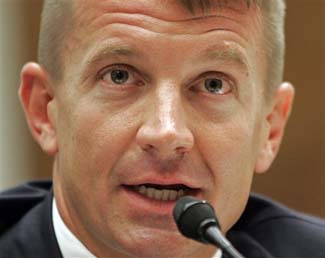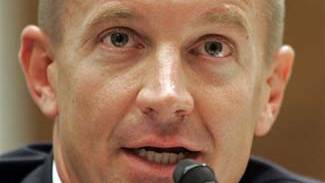Blackwater Tapped Foreigners For Secret CIA Program
Source: huffingtonpost.com
When the CIA revived a plan to kill or capture terrorists in 2004, the agency turned to the well-connected security company then known as Blackwater USA.With Blackwater's lucrative government security work and contacts arrayed in hot spots around the world, company officials offered the services of foreigners supposedly skilled at tracking terrorists in lawless regions and countries where the CIA had no working relationships with the government.
Blackwater told the CIA that it "could put people on the ground to provide the surveillance and support – all of the things you need to conduct an operation," a former senior CIA official familiar with the secret program told The Associated Press.
But the CIA's use of the private contractor as part of its now-abandoned plan to dispatch death squads skirted concerns now re-emerging with recent disclosures about Blackwater's role.

In this Oct. 2, 2007, file photo, Blackwater USA founder, Erik Prince, testifies before the House Oversight Committee on Capitol Hill in Washington. The private contractor had won the government's confidence by handling security and training operations in Iraq and Afghanistan, but the decision, revived by CIA in 2004, to use the private contractor as part ofits now-abandoned secret program to kill or capture terrorists in sensitive overseas operations, struck some former agency officials as highly unusual. (AP Photos/Susan Walsh, File)
The former senior CIA official said he had doubts during his tenure about whether Blackwater's foreign recruits had mastered the necessary skills to pull off such a high-stakes operation. Blackwater's later hiring of several senior CIA officials who were involved in or aware of the secret program, including one of the men who ran the operation, showed the blurred lines of using a private contractor for such a highly classified and dangerous project.
While Blackwater won the government's confidence by handling security and training operations in Iraq and Afghanistan, the 2004 decision by CIA officials to entrust the North Carolina-based company with such a sensitive overseas operation struck some former agency officials as highly unusual.
"The question remains: Why do we need Blackwater?" said Charles Faddis, a former department chief at the CIA's Counterterrorism Center who retired in 2008 and was not involved in the secret program. "I remain mystified. This is quintessential CIA work. You wonder what it means that the CIA has to rely on Blackwater? Why are we still funding the CIA?"
The former senior CIA official who had knowledge of the program explained that "you wouldn't want to have American fingerprints on it."
The former official and several other current and former officials spoke on the condition of anonymity because the information remains classified.
Xe spokeswoman Stacy DeLuke did not respond to questions seeking comment. Blackwater altered its corporate name to Xe Services after a series of use-of-force controversies, including a September 2007 shooting in Baghdad by five company security guards that left 17 civilians dead.
The former senior CIA official said that close to a dozen Blackwater "surrogates" were recruited to join the death squad program. The recruits, the former official said, were not told they were working for the CIA. The official did not know how Blackwater found them.
The program reportedly cost millions of dollars over an eight-year span. A precise figure is not available because of the agency's classified budget.
The operation had several lives under four successive CIA directors: George Tenet started the program during the Bush administration, but canceled it, another former CIA official said, because there were too many risks involved.
The operation was revived under Tenet's successor, Porter Goss, who ran the agency from 2004 to 2006. Michael Hayden, who served from 2006 to 2009, downgraded the program to intelligence-gathering only. Leon Panetta, the current director, killed the operation in June.
The former senior CIA official said that after the death squad project was revived under Goss in 2004, there were serious questions about whether Blackwater's operatives had demonstrated the ability to conduct clandestine surveillance and maintain fictitious identities with credible-appearing faked documents.
Their need to provide rock-solid cover stories was essential, the former official said, adding that they had to have a "damn good reason to be there."
A spokesman for Goss declined comment.
The former senior CIA official said that during his tenure it was unlikely that the Blackwater recruits would have been involved directly in the mechanics of the killings. Instead, they were learning how to spy on targets and operate discreetly.
The trainees never got a chance to prove themselves. They were never provided a target and no operation was ever approved. CIA spokesman George Little said the program yielded no successes.
The CIA started planning for its death squad project shortly after the attacks of Sept. 11, 2001. The agency wanted the ability to target terrorists at close range, providing an alternative to air strikes that ran the risk of accidentally killing civilians.
Another former senior intelligence official said the use of Blackwater was not the only plan considered to kill or capture terrorists.
Blackwater long has had a close and intertwined relationship with the CIA. Several senior agency leaders have taken up positions with the company. Among them were J. Cofer Black, once the head of the CIA's Counterterrorism Center, who would have had operational involvement with the secret plan in the early 2000s. Others included Robert Richer, a former deputy director for operations, and Alvin B. Krongard, a former CIA executive director.
Another Blackwater hire was Enrique "Ric" Prado, a former operations chief at the Counterterrorism Center. Prado ran the death squad program when it was started up under Tenet, three former intelligence officials said.
According to one former official, Jose A. Rodriquez Jr., who ran the CIA's clandestine service and was instrumental in reviving the program, reached out to Prado, then working at Blackwater. The two men had previously worked together in Latin America and then at the Counterterrorism Center, the former officials said.
After joining Blackwater, according to The New York Times, Prado was involved in the 2004 negotiations between Blackwater officials and the CIA over its involvement in the death squad operation. According to the Times report, Prado, who at one point was Blackwater's vice president of special programs, worked with Erik Prince, Blackwater's founder, to sign agreements with the CIA to participate in the program.
Prado did not return messages left at his home or with his business partner, Joseph E. Fluet. The pair recently formed The Constellation Consulting Group, an international intelligence and security firm based in northern Virginia.
At the time that Blackwater began working with the CIA on the death squad operation in 2004, the CIA had in place a long-standing policy mandating that senior officials leaving the agency could not go to work for private firms for a year after their departure. In 2007, Hayden toughened requirements for the entire agency, mandating an 18-month hold on security clearances for all departing employees who leave prior to retirement.
Scott Amey, general counsel for the Project on Government Oversight, a watchdog group in Washington, said "the revolving door is a very accepted practice" between government and private industry, but added that "to be able to bring people in from the CIA, there is a possibility that it gives you a competitive advantage in receiving awards from that agency."
When Panetta terminated the CIA's death squad program in June, he informed congressional intelligence committees about its existence in an emergency briefing.
The House Intelligence Committee is investigating whether the CIA broke the law by not quickly informing Congress about the secret program.
Article from: HuffingtonPost.com






















